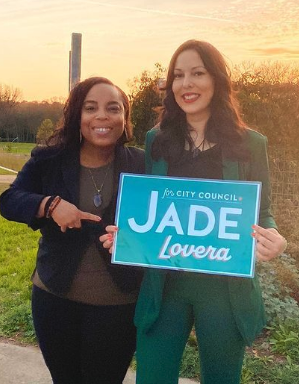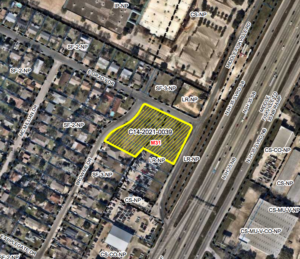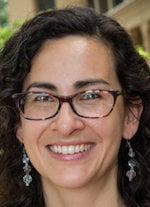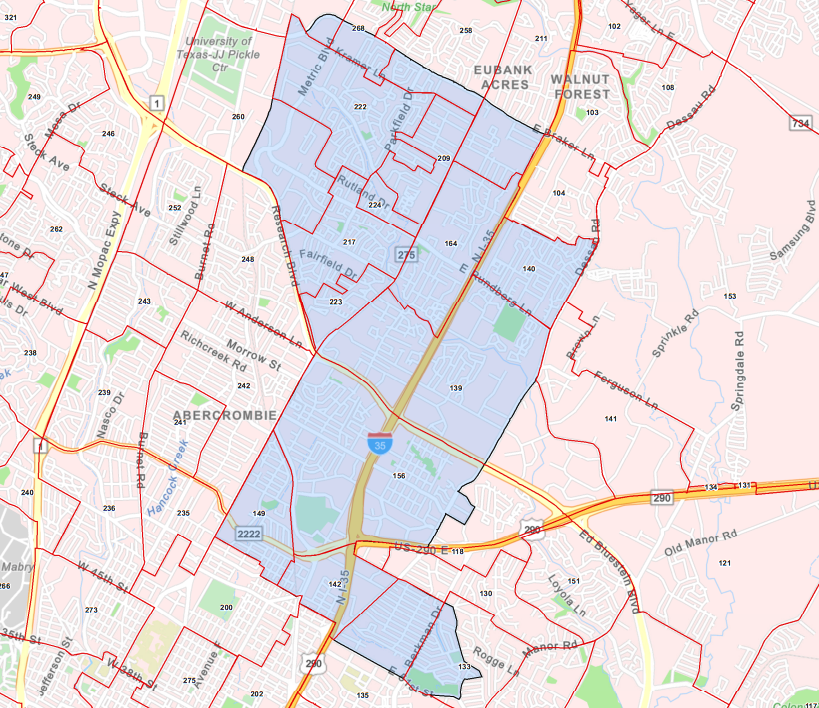Jade Lovera runs as outsider in special council election
District 4 council candidate Jade Lovera is running a color-coordinated, green-themed campaign that matches the meaning of her first name. Her campaign mixes upbeat energy and messaging with a sharp critique of City Hall.
Lovera advocates land use policies that would preserve single-family zoning and keep parts of Austin visibly greener and less dense, and she’s calling for more investment in parks in District 4.
The candidate is green in another sense too: she has no prior campaign experience, nor was she even very politically engaged before 2021.
But Lovera is playing that up as a strength, touting her status as a political outsider and a “community voice.” Rather than political experience, Lovera says she brings a businesswoman’s savvy and a life-long familiarity with District 4.
If she wins, Lovera would serve out the remainder of Council Member Greg Casar’s term through 2024. Casar, one of Austin’s best-known politicians, is stepping down to run for Congress.
His successor will be chosen in a special election January 25th. Early voting is available at three locations and runs through January 21th.
Lovera faces six other candidates in the contest for the position, whom the Bulldog is profiling separately.
Business and management experience
Lovera, 35, worked for more than a decade in property management at various apartment communities, from 2007 to 2019. She started as an assistant manager before moving up to community manager and ending as regional manager.
After that, she worked two and a half years as operations director at HERdacity, an Austin nonprofit that helps women achieve professional goals. “I only have good things to say about working with her,” said Tara Levy, who was interim executive director of HERdacity during Lovera’s time at the organization.
“One of the HERdacity core values was integrity, and I always felt like Jade modeled that in her actions and decisions…That integrity is also one of the reasons I believe she’ll be a wonderful addition to our city council.”
As director of operations, Lovera was responsible for finances, budgeting, purchasing, and more, Levy told the Bulldog. “It was her responsibility to ensure that consistent, efficient workflows were in place for all systems—from HR to IT—and that each was cost-effective and met our organizational needs.”
When she joined HERdacity in 2019, Lovera was already involved in another nonprofit with a similar mission, Women Who Werk, according to Levy. But there wasn’t any conflict between the two roles, she said. “She disclosed everything appropriately…and we also documented it in accordance with our conflicts of interests policy during my tenure there.”
“The two roles always felt complementary, and Jade was, in fact, able to bring opportunities, supporters, and activities to the HERdacity audience through her role at Women Who Werk, which was great.”
When the board decided to start closing down the organization, Lovera left HERdacity in October 2021, a little more than a month before launching her council run.

Currently, Lovera is focused on her campaign while also serving as chief strategy officer of Women Who Werk. She told the Bulldog that that organization was founded by her high school friend Ashton Lynne Rondon in 2015. “Initially, I unofficially helped her behind the scenes. Eventually, I joined officially, as our passions and purpose aligned,” she said.
Lovera described her friendship with Rondon and deep and mutually supportive, adding, “We realized that a lot of women do not have life relationships like this. We wanted to provide women the resources and community to harvest the benefits of these fundamentals.” They drew on their experiences to create a workshop curriculum “to help guide others to heal from the inside out and overcome internal blocks or limiting beliefs in order to live a more fulfilled life,” she said.
‘The system is broken’
Lovera launched her campaign December 8th in a news conference at the Gus Garcia Recreation Center, flanked by neighbors, family, and friends. It was her first foray into politics, she said, acknowledging that previously she “was not very civically engaged.”
The immediate catalyst for her campaign was a zoning case in her neighborhood, which she referred to as a “dramatic upzone.” Lovera testified at the Planning Commission against the plan and mobilized neighbors against it.
“I spent the last nine months working with the city, developers, and other neighborhood leaders to come up with a solution in line with the neighborhood’s character, residents, and needs,” she said.
In spite of this, the zoning case moved forward. Frustrated, Lovera decided to jump into the council race as a way of bringing about change. “This process led me to a realization,” she said. “Our city has become transactional and the system is broken. It is more interested in doing deals than in actually serving residents or solving problems.”
Zoning protest
Lovera lives in a small neighborhood wedged between Interstate 35 and North Lamar Boulevard near the Chinatown Center. It consists mostly of single-family homes, with fourplexes along one street and some businesses around the edge of the neighborhood, as well as several schools and low-rise apartment buildings.

Last year a developer applied for zoning changes on seven vacant lots between Brownie Drive, a residential street, and Middle Fiskville Road, which runs parallel to the I-35. The land, consisting of 1.8 acres, was zoned for single-family use on four lots and for neighborhood commercial use on three lots. The developer wanted new zoning for moderate-to-high density multifamily along Brownie Drive and mixed-used commercial along Middle Fiskville Road.
“The proposed changes would allow for development of much needed residential dwelling units, placing greater residential densities to the periphery of an established, traditional neighborhood area and within a half-mile of existing transit service,” wrote Victoria Haase of Thrower Design, a land planner representing the owner, in her March 2021 proposal to the planning commission.

Haase added, “Successful rezoning of these properties will create an appropriate transition in land use intensity between the commercially zoned properties fronting IH-35/Middle Fiskville Road and the interior single-family zoned properties of this area that currently does not exist.”
But Lovera objected that the development would worsen crime and traffic and raise costs for existing homeowners because appraisal values would go up. It would be appropriate to build duplexes, she said—something already authorized under existing code—but the denser development was “completely incompatible” with nearby single-family zoning.
“Approving these petitions will enable the gentrification process to begin in our neighborhood,” Lovera wrote in an email to the planning commission. “The majority of residents in this neighborhood have lived here for 20-plus years and are minorities including Hispanic and Black families.
“Long-term and lifelong residents will soon be forced to leave the neighborhood because of the inflation of housing rates caused by the new construction…Surely, it cannot be true that our city values outside money coming in over established culture rich residents.”
Owner representatives countered that zoning the property for fewer residential units (which it plans to sell, not rent) would actually “gentrify” the neighborhood faster because each unit would have more space, making them more expensive.
Yet other neighbors echoed Lovera’s concerns about traffic and neighborhood character. For example, Preston King, whose home is a few blocks away, wrote to city planners that streets in the area were narrow and single-lane and “any multi-unit structure will flood our streets with more traffic.”
Stacy Beckwith, who lives across the street from the property in question, wrote that she was “adamantly” opposed to the rezoning, saying, “This neighborhood has thrived in its own kind of vibe for over 20 years and we do not want a development coming in and ruining the family atmosphere so many have worked to establish. Nor do we want the higher taxes associated with such an eyesore.”
Partial victory
These protests succeeded in forcing delays in the rezoning process and partly won over city staff, who recommended a compromise that would allow the developer to build only about half of the 70 condo units it had originally proposed.

The Planning Commission approved that arrangement in a 9-1-1 vote September 14, 2021, with Commissioner Carmen Llanes Pulido against and Awais Azhar abstaining. The Austin Monitor reported, “In an attempt to appease neighbors wary of new multifamily development, the Planning Commission Tuesday recommended less dense zoning than was requested by the owner of several vacant lots at Grady and Brownie drives in North Austin….”
Commissioner Claire Hempel said that the rezone “seems like a compromise that staff has come up with between the neighborhood and what the applicant is looking for.”
Lovera told the Bulldog that this decision was “absolutely a win at about half the size of the desired development…however, the development is still incompatible and too invasive for the location and neighborhood circumstances.”
When the council took up the zoning case November 4, 2021, three members opposed it on first reading: Alison Alter, Kathie Tovo, and Mackenzie Kelly. Final approval on second and third reading was scheduled for December 9, 2021 but Casar requested a postponement until January 27, 2022 two days after the election.
Lovera said she feared the developer was making a last-ditch effort to secure approval for more density by offering to include more affordable housing, and Casar was maneuvering to help them. “Casar has had zero interest or effort in communicating with us about this case. Yet, he has been negotiating and figuring out how to get the developers what they wanted throughout the case,” she claimed.
Sharp-elbowed
Of the seven candidates in the race, Lovera may be the most outspokenly critical of City Hall and the outgoing incumbent, Greg Casar, tossing around words like “transactional” and “corrupt.”
When she launched her campaign, the first sentence in her speech referred to District 4 as “misrepresented”—a not-too-subtle dig at the incumbent. She said, “I know firsthand that for far too long District 4 has been underinvested and misrepresented. Austin needs a council member that listens to the people already here. District 4 deserves a full piece of the attention and financial pie….”
Similarly, on The Austin City Councilman podcast hosted by fitness and wellness enthusiast Brad Swail, Lovera said, “My personal experience with being represented by Casar has not been inclusive at all. From what I gather just from my experience, as well as experiences that others have shared with me in the district, is that he has already made up his mind for what he wants and nothing is going to change that.”
“He’s not really interested in hearing anything otherwise.”

Lovera’s sharp-elbowed criticism of City Hall and her passionate advocacy on land issue attracted the attention of some long-time critics of upzonings and CodeNEXT, the council’s abortive effort to overhaul the land code. One of them was Mary Ingle, a past president and current co-vice president of the Austin Neighborhoods Council (ANC), who is now volunteering to support Lovera’s campaign.
Ingle told the Bulldog that she initially connected with Lovera last year through the ANC, which Lovera had contacted for some help with her zoning case. She said she’s since gotten to know the candidate better and described her as “refreshingly honest” and “easy to work with.”
Ingle wrote in an email, “I have been following at a distance Jade’s zoning case going through the city process this past year—it is all such a familiar story! We are all just one bad zoning case away from getting involved in our community—it happened to me long ago.”
“I think that Jade is a great candidate for District 4. She really wants the city council to listen to the community! She is so talented and energetic. She cares about the residents and the businesses in this underserved district.”
‘Artificial’ housing crisis
On the issue of housing supply and affordability, Lovera strikes a different tone from the incumbent, Casar, and his endorsed successor, Jose “Chito” Vela III, who served as Casar’s planning commissioner 2015-2017. Both have stressed the need for more housing supply, including more vertical mixed-use zoning, which allows for more units to be built per lot.

Lovera agrees that there’s an affordability problem but questions whether just adding more density will address it. In some cases, newer buildings actually displace more affordable, older housing stock and drive up neighboring home values, resulting in higher property taxes, she contends.
That was the argument she made in her zoning protest, and it’s also one she thinks applies citywide. On her campaign website, she writes, “We are suffering as a community due to an artificial housing crisis which is a fundamental piece of the affordability crisis…Simply building more housing stock will primarily produce more luxury housing targeted at future predominantly privileged-class residents, with little regard to those already here.”
Similarly, on The Austin Common podcast, she said, “Our most affordable units are our current stock, our older communities, our older homes—those are affordable. And to come in and destroy those neighborhoods to build high luxury price housing further exacerbates the affordability issue.”
Lovera points to data showing thousands of new apartment units have been constructed in the past year, warning the city is at risk of becoming “oversaturated” with apartment homes.
According to ApartmentData.com, 13,763 apartment units have been built in Austin in the past 12 months, and occupancy stands at 92.5 percent, which is a lower rate than San Antonio and Dallas-Fort Worth and below that national average of 97.5 percent occupancy.
Public safety
Lovera is among three candidates who have made public safety a focus of their campaign (the other two being Amanda Rios and Melinda Schiera). She wants to see more community policing in District 4 to tackle high crime.
At a candidate forum January 6 moderated by the League of Women Voters Austin Area, candidates were asked where they would put District 4 “on the continuum from overpoliced to ignored.”
Lovera responded: “Absolutely ignored. We have the highest crime in all of Austin in District 4. We have always been underserved…I believe in community policing because it works.”
Twenty-three of Austin’s 89 murders in 2021 took place in District 4 or right on its boundary line, and another three occurred very close to the district, according to a map compiled by KXAN, which the Bulldog compared to a map of the council district.
Lovera added that she would support modifications to the police union contract (technically the Meet and Confer Agreement)—which is up for renegotiation later this year—to ensure greater accountability of officers.
Lovera had her own brush with the law in 2004, when she was still in high school, after she intervened in a fight between a friend and another female student. She was prosecuted for assault for allegedly kicking the student in the face, according to the criminal complaint, but was found not guilty in a bench trial.
Lovera also was charged in 2006 for stealing a $79.99 store credit voucher while working a cashier at an electronics store. According to the affidavit of the detective who investigated the case, Lovera did not apply the voucher to the customer’s bill but instead kept it for her own use and later spent it on a purchase of her own.
However, the case was dropped under a deferred prosecution agreement, according to county records.
Asked about these cases, Lovera told the Bulldog that they happened so long ago that they were “irrelevant,” and felt she could have been treated with more “grace” by the criminal justice system.
Parks and green spaces
Environmentalism is often a popular campaign theme in Austin council races, and Lovera is no exception. She’s advocating for more parks, saying that District 4 is “park deficient.”
She’s also tying her environmental message to her advocacy around land use. “We need more green space. During my research I learned that north Austin has less than 3 percent of undeveloped land, resulting in higher heat levels.”
New development projects “result in more concrete, raising our heat even more,” she said at a candidate forum moderated by the Windsor Park Neighborhood Association. “A focus on green infrastructure is crucial for a healthy Austin in the future.”
Lovera called for detailed review of environmental factors in developments, saying they should evaluated for the use of innovate green spaces and the preservation of existing trees.
In a dig at the pro-density urbanist movement, Lovera said, “True urbanism done right is conscious of the quality of life and green spaces. And that should be at the forefront here.”
Personal life and education
Lovera, age 35, is the single mother of a 12-year-old son and a 6-year-old daughter. She owns an 835-square-foot home inherited from her father in 2014, according to records kept by the Travis Central Appraisal District.
She grew up in District 4, attending Lanier High School (which is now Navarro Early College High School), and Dobie Middle School. She attended classes at Texas State University from August 2006 to May 2009, according to enrollment verification. She left before completing her degree, a few months before the birth of her son.
During her studies, Lovera was also working in property management. She says she earned certifications as an apartment portfolio supervisor and apartment manager from the National Apartment Association.
In addition to her role at Women Who Werk, Lovera is the owner of the Bongo Bus, a small business inherited from her father. On her campaign website, Lovera says that her father came from Venezuela and her mother is from Missouri.
For Lovera, her campaign isn’t just about policy in the abstract—it’s also about her loved ones and the neighborhood she grew up in. At her campaign kickoff, she said, “I worry if my kids will be able to afford living here as they get older.”
 Trust indicators: Bulldog reporter Daniel Van Oudenaren is a journalist with 13 years experience in local, state, and international reporting.
Trust indicators: Bulldog reporter Daniel Van Oudenaren is a journalist with 13 years experience in local, state, and international reporting.
Links to related information:
Jade Lovera’s campaign website is at https://www.jadeforaustin.com/
Links to related coverage:
Moderate campaigns for D4 council seat, January 10, 2022
Anti-displacement campaigner runs for Casar’s council seat, January 6, 2022
Vela takes big lead in fundraising for D4 special election, December 30, 2021








Excellent reporting!!!!
Good article. Thank you. Appreciate your getting the facts straight, unlike some other opinion, innuendo, and downright untrue published material masquerading as journalism that I’ve seen today about this candidate.
I would note that a major argument in that zoning case is that the FLUM in the Neighborhood Plan for Jade’s area has already zoned lots of properties for this type of higher density development all along the transit corridors where there actually exists the curbs, gutters, sidewalks, grocery stores, schools, transit, etc. infrastructure, exactly as all major city development vision and policy recommends. This promotes density in logical places, precluding the need to eradicate the tiny bit of single-family homes and open land available for missing-middle housing left in one of the already densest neighborhoods in Austin.
The hope was that Council will direct developers to invest in this area on the corridors, thus creating win-win for both long term local denizens and new people who want to move here.
Great article, thanks for the quality journalism.
I got a flyer from her campaign, which claimed Vela is backed by real estate, construction, and development interests—without providing any evidence. I then Googled the PAC whose name appeared in the fine print at the bottom of the flyer as her main financial supporters. Turns out all of Jade Lovera’s campaign money comes from developers, real estate, and construction firms! Her biggest donor is the Cumby Group, a construction firm. All the other individuals listed as top donors are all real estate and development people. The hypocrisy of Lovera is frankly stunning. She has almost no grass roots donors—it’s all special interest money from developers. This website should do a little digging to find out what’s going on here. It’s very suspicious.
I don’t live in Texas, however, I have known Jade for a number if years. We worked together in the Tulsa area at an apartment complex.
I can say beyond a shadow of a doubt, that Jade is the most honest, trustworthy, down to earth person I have ever met in my life. I have know countless people in my 54 years and being from England, I have met scores of people all around the globe.
She was more than a coworker, she was and still is a dear friend.
That being said, when Jade has a focus, you can believe it is razor sharp. She finds a particular path in any situation, and makes sure, and I mean absolutely sure that every detail has been dealt with.
I have never seen someone that is as detailed as she is. We used to joke that her skills in the apartment management industry was far better than our supervisor, whom at the time was a the property manager. She far outperformed, the manager.
She was the one whom ran that property. She knew the people to put in positions that best suited them so they could succeed.
If she does not get elected to the position, the people are losing out on the best person they could hope for.
Jade is a leader beyond any I have know in professional or personal life. The people need her. It will be a tremendous mistake to nor elect her.